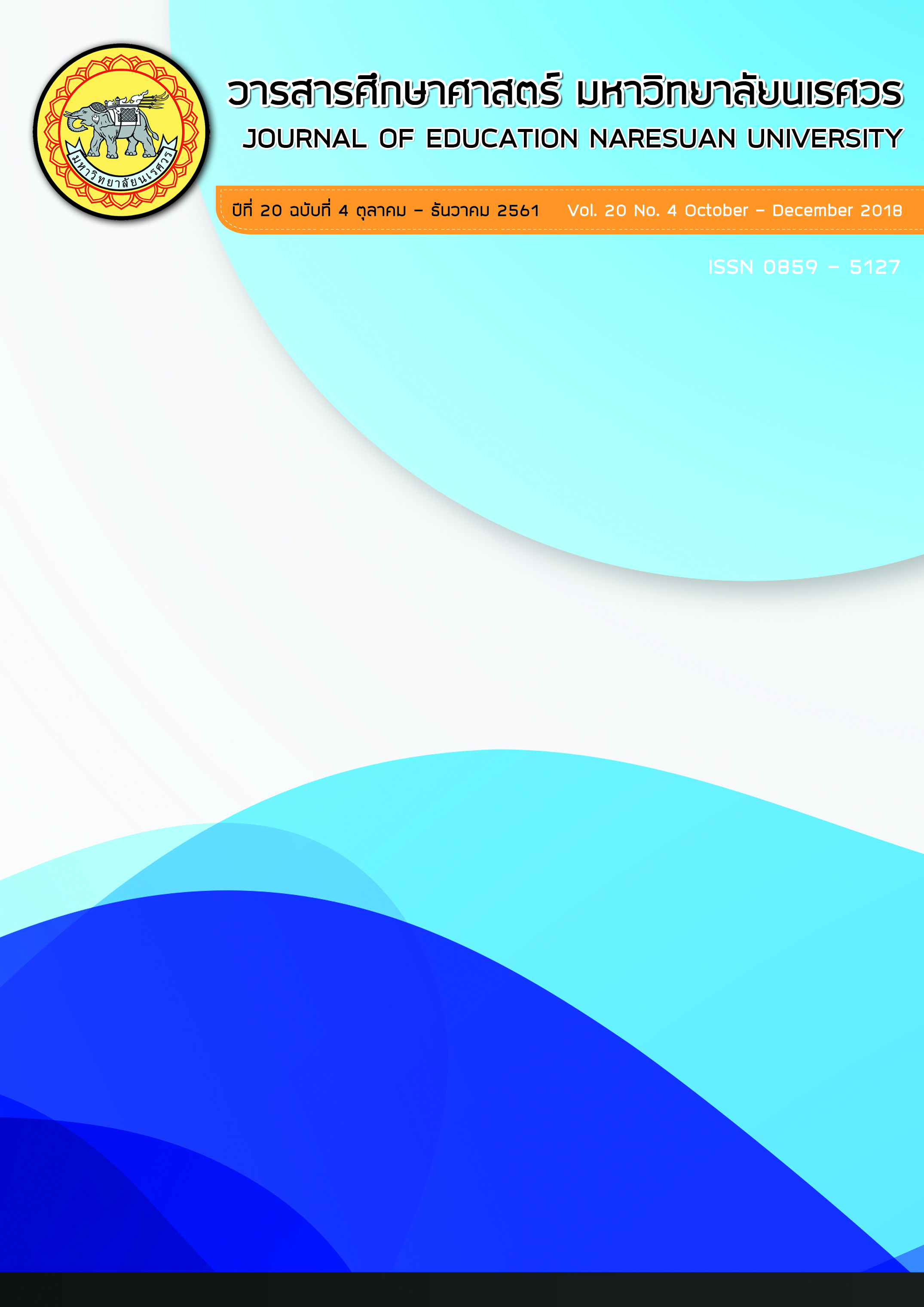ผลการจัดกิจกรรมการเรียนรู้โดยกระบวนการเรียนรู้ QSCCS ร่วมกับการเรียนรู้ จากแหล่งเรียนรู้ในชุมชน เพื่อส่งเสริมความสามารถการเชื่อมโยงทางคณิตศาสตร์ สำหรับนักเรียนมัธยมศึกษา; THE RESULT OF QSCCS LEARNING PROCESS AND LEARNING RESOURCES IN THE COMMUNITY TO PROMOTE THE ABILITY OF MATHEMATICAL FOR SECONDARY STUDENT
Main Article Content
Abstract
การวิจัยครั้งนี้มีจุดมุ่งหมายเพื่อ 1) สร้างและหาประสิทธิภาพของแผนการจัดกิจกรรมการเรียนรู้ 2) เปรียบเทียบผลสัมฤทธิ์ทางการเรียน และ 3) เปรียบเทียบความสามารถการเชื่อมโยงทางคณิตศาสตร์ ก่อนและหลังการจัดกิจกรรมการเรียนรู้โดยใช้กระบวนการเรียนรู้ QSCCS ร่วมกับการเรียนรู้จากแหล่งเรียนรู้ในชุมชน เพื่อส่งเสริมความสามารถการเชื่อมโยงทางคณิตศาสตร์ สำหรับนักเรียนมัธยมศึกษา กลุ่มตัวอย่างคือนักเรียนชั้นมัธยมศึกษาปีที่ 2 ภาคเรียนที่ 1 ปีการศึกษา 2558 ของโรงเรียนบ้านห้วยลึก อำเภอเวียงแก่น จังหวัดเชียงราย จำนวน 30 คน เครื่องมือที่ใช้ในการวิจัย ประกอบด้วย 1) แผนการจัดกิจกรรมการเรียนรู้โดยใช้กระบวนการเรียนรู้ QSCCS ร่วมกับการเรียนรู้จากแหล่งเรียนรู้ในชุมชน เพื่อส่งเสริมความสามารถการเชื่อมโยงทางคณิตศาสตร์ เรื่อง การแปลงทางเรขาคณิต 2) แบบทดสอบวัดผลสัมฤทธิ์ทางการเรียนและวัดความสามารถการเชื่อมโยงทางคณิตศาสตร์ เรื่อง การแปลงทางเรขาคณิต วิเคราะห์ข้อมูลโดยใช้ค่าเฉลี่ย ส่วนเบี่ยงเบนมาตรฐาน สถิติทดสอบ t – test dependent sample ผลการจัดกิจกรรมการเรียนรู้โดยใช้กระบวนการเรียนรู้ QSCCS ร่วมกับการเรียนรู้จากแหล่งเรียนรู้ในชุมชน เพื่อส่งเสริมความสามารถการเชื่อมโยงทางคณิตศาสตร์ เรื่อง การแปลงทางเรขาคณิต ชั้นมัธยมศึกษาปีที่ 2 พบว่า 1) การจัดกิจกรรมการเรียนรู้มีประสิทธิภาพ E1/E2 เท่ากับ 85.75/84.67 สูงกว่าเกณฑ์ที่กำหนดไว้ 80/80 2) นักเรียนมีผลสัมฤทธิ์ทางการเรียน เรื่อง การแปลงทางเรขาคณิต หลังจัดกิจกรรมการเรียนรู้สูงกว่าก่อนจัดกิจกรรมการเรียนรู้ อย่างมีนัยสำคัญทางสถิติที่ระดับ .05 และ 3) นักเรียนมีความสามารถการเชื่อมโยงทางคณิตศาสตร์ เรื่อง การแปลงทางเรขาคณิต หลังจัดกิจกรรมการเรียนรู้สูงกว่าก่อนจัดกิจกรรมการเรียนรู้ อย่างมีนัยสำคัญทางสถิติที่ระดับ .05
THE RESULT OF QSCCS LEARNING PROCESS AND LEARNING RESOURCES IN THE COMMUNITY TO PROMOTE THE ABILITY OF MATHEMATICAL FOR SECONDARY STUDENT
The objectives of this study were: 1) to create and determine the efficiency of learning activities lesson plan, 2) to compare learning achievement, and 3) to compare the ability of mathematical connections before and after learning activities using of QSCCS learning process and community learning resources to promote the ability of mathematical connections in the topic of geometric transformation of Matthayomsuksa 2. The samples in the research were 30 students of Matthayomsuksa 2, from a secondary education extension school, Wiang Kan District, Chiang Rai Province, in the first semester, Academic Year 2015. The tools used in the research were; 1) a learning activities plan using QSCCS learning process and learning resources in the community to promote the ability of mathematical connections under the topic of geometric transformation in Matthayomsuksa 2, and 2) a test to evaluate learning achievement and determine the ability of mathematical connections in the topic of geometric transformation of Matthayomsuksa 2. The research data was analyzed by means of mean, standard deviation, and t-test dependent. According to learning activities using of QSCCS learning process and learning resources in the community to promote the ability of mathematical connections under the topic of geometric transformation in Matthayomsuksa 2, it was found that; 1) the efficiency E1/E2 of learning activities was 85.75/84.67, higher than the desirable point of 80/80, 2) the posttest learning achievement scores was higher than the pretest learning achievement scores at a statistical significant level of 05, and 3) the mathematical connection posttest scores in geometric transformation of the students were higher than pretest scores at statistically significant level of .05.
Article Details
The owner of the article does not copy or violate any of its copyright. If any copyright infringement occurs or prosecution, in any case, the Editorial Board is not involved in all the rights to the owner of the article to be performed.
References
Deetes, T. (2009). The development of the northern ethnic groups, problems and solutions. Documents seminars ethnic diversity is one Spirit to Thailand, the Ministry of Culture. (in Thai)
Inprasit, M. (2009, September). Education: Math teacher mold to excellence. Sharp, 7. (in Thai)
Kamee, W. (2001). The plan activities using conventional mathematics learning in the school community irrigation cliff. Chiangmai Province. (Independent Study, Chiang Mai University). (in Thai)
Khumtavee, A. (2007). The project uses resources and local knowledge in school Tharang (United rat). Phetchaburi: Home Tharang (United rat). (in Thai)
Office of the Basic Education. (2012). Guidelines for teaching in schools of international standard. Revised. Bangkok: Agricultural Cooperatives of Thailand. (in Thai)
Office of the Education Council. (2007). Learning from Learning Resources. Bangkok: Agricultural Cooperatives of Thailand. (in Thai)
Pukiat, L. (2001). Project Learning: Principles and Guidelines for the event. Bangkok: Chulalongkorn University. (in Thai)
Rukpo, C. (2008). Development of activities linked by the geometric transformation mathematical pattern Wiang Kalong (Independent study). Chiang Mai: Chiang Mai University. (in Thai)
Sangphun, J. (2006). Teaching: Skills and mathematical processes. Chiang Mai: Faculty of Education Chiang Mai University. (in Thai)
Sengsri, S. (2014). Teaching students to manage resources for learning. Phitsanulok: Naresuan University. (in Thai)
Udomsin, P. (2005). Evaluation of learning in authentic learning mathematics. Journal of Education Chulalongkorn University, 33(3), 15-20. (in Thai)
Wachirasukmongkol, B., & Sengsri, S. (2014). An assessment of the project development, teacher quality by using the built in nanny (Coaching and Mentoring): Teachers of the Year. Sukhothai area second strand in Thailand. Journal of Education Naresuan University, 15(4), 165-172. (in Thai)


